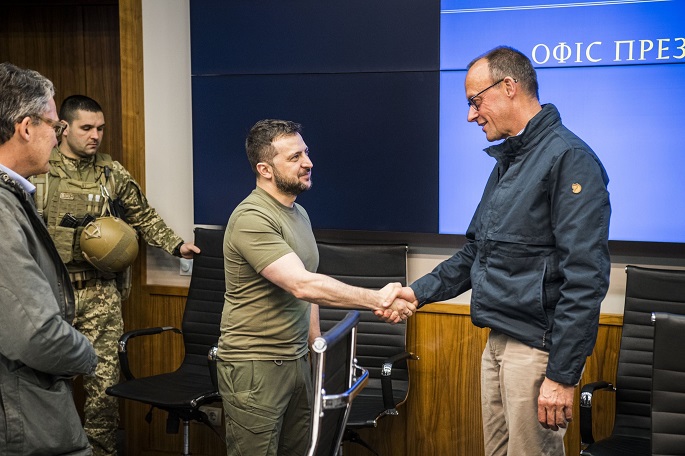German opposition leader visits Kiev after chancellor's no-show
Published : 03 May 2022, 22:44
German conservative opposition leader Friedrich Merz was spotlighting his own trip to Kiev on Tuesday, after Chancellor Olaf Scholz ruled out a visit to war-torn Ukraine's capital.
The Ukrainian leadership has complained for weeks that Scholz's government has been too slow in isolating Moscow and too hesitant in delivering heavy weapons to battle the Russian invaders.
Kiev's recent refusal to welcome a visit by German President Frank-Walter Steinmeier strained ties further.
"A night in the sleeper car on the way to #Kyiv," Merz wrote - using an alternative spelling for the city - on Twitter alongside a 17-second video showing him on the train.
"We have an interesting journey ahead of us and, so far, all I can say is all is safe, all is well and the Ukrainian authorities are extremely cooperative. Very pleasant people. It's nice to be in this country," said Merz, who heads Germany's conservative Christian Democrats (CDU).
The opposition leader plans to meet Ukrainian head of government Denys Shmyhal and Kiev Mayor Vitali Klitschko during his visit to Kiev, but not President Volodymyr Zelensky.
German Foreign Minister Annalena Baerbock and other Bundestag lawmakers also have visits to Kiev in the works.
Merz's arrival in Kiev on Tuesday afternoon came shortly after Scholz ruled out a trip to Kiev for the time being, citing the Ukrainian leadership's recent decision to disinvite Steinmeier.
Steinmeier planned to go to Kiev with the heads of state of Poland, Latvia, Estonia and Lithuania in mid-April, but was rejected at short notice.
The decision by Kiev came amid criticism of Steinmeier's connections with Russia and his failure to heed warnings from Eastern European neighbours about the threat of Russian aggression during his time serving as foreign minister.
In an interview with public broadcaster ARD late Monday, Scholz said that it was not acceptable that a country that provides so much military and financial aid is told that its head of state may not come and visit.
In the first eight weeks of the Russian war, Germany sent weapons and equipment worth more than €190 million ($201 million).
Germany gave the go-ahead for the delivery of war weapons worth 120.5 million euros and other armaments worth 71.4 million euros between February 24 and April 19, according to the German Economy Ministry.
Last week, Berlin approved the export of 50 Gepard anti-aircraft tanks, marking the first time heavy weapons will be delivered directly from Germany.
Ukrainian ambassador to Berlin Andriy Melnyk sharply criticized Scholz for ruling out a visit to Kiev.
"Being in a huff doesn't sound very statesmanlike," Melnyk told dpa.
"This is about the most brutal war of annihilation since the Nazi attack on Ukraine, it's not a kindergarten," the ambassador said.
Melnyk said Zelensky remains happy to receive the German chancellor in Kiev.
But he added: "What Ukraine would look forward to much more than any symbolic visits is that the governing German coalition implement the Bundestag's request for the delivery of heavy weapons quickly and fulfil promises made so far."
Melnyk criticized that no ammunition had yet been found for the Gepard anti-aircraft tanks which Germany has promised to deliver.
The tanks are the first heavy weapons to be delivered directly from Germany to Ukraine in the current conflict.
Also on Tuesday, the heads of government of Sweden and Finland, Magdalena Andersson and Sanna Marin, were attending a German Cabinet meeting at Schloss Meseberg, an 18th-century castle north of Berlin.
Both countries are considering joining the NATO military alliance in light of Russia's war in Ukraine.


